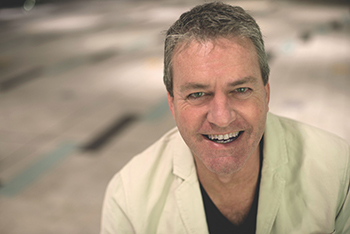Colon Cancer Survivor
Clearing the path for survivors who follow

After receiving a diagnosis of metastatic colon cancer at 52, Tim McDonald discovered that advocating for himself makes an enormous difference in his life. He joined the cancer support community to educate and help colon cancer survivors realize they don’t have to go through this alone.
Not many people get to say they’ve saved two dozen lives. So far, that’s how many people I know who have heard me promote early detection, gone for their colonoscopies and had polyps removed — polyps that could have become cancerous.
I share my story wherever I can. I’ve been called a pioneer who is paving a path, figuring out how to get around the obstacles to show others the way. I fully supported moving the age for the first colonoscopy to 45, and I’m committed to helping others as they go down that same path.
After pain in my right flank forced me to walk in to an urgent care near our home, I learned I had a major blockage in my colon. The doctor told me it was cancer. I simply smiled and asked what we needed to do. The doctor was taken aback by my smile, but I’m a realistic person and that is how I handle things.
Because this happened during the pandemic, the first step was to get a COVID-19 test, then a colonoscopy. After the procedure, the doctor and nurses came back to the recovery area to wish me well. I could tell they assumed it was cancer. I wasn’t in denial, but I wanted to wait for the biopsy results to know for sure. It was Stage IV cancer.
I was referred to an oncologist who ordered a PET scan that made my liver look like the night sky on the Fourth of July. The treatment focus he suggested would be to keep the cancer from spreading farther than my liver by using chemotherapy.
My doctor referred me to another oncologist who was much closer to home, and before I left he gave me the best advice I’ve had throughout my journey: get a second opinion, or a third, fourth or fifth.
The new oncologist didn’t agree with my treatment plan because, in her opinion, I only had three years to live. She just wanted to keep me comfortable. I didn’t agree with her plan, and her prognosis devastated my wife Lori. I reminded Lori that was the doctor’s story, but it wasn’t mine. It encouraged me to advocate for myself.
I shared my story on Facebook and, in return, received a huge positive response along with a connection to a nearby cancer center and oncologist who focused on me. He recommended chemotherapy and surgery to remove the primary tumor. I didn’t realize that I’d had biomarker testing as part of my diagnostic tests earlier on, but according to this doctor, I did and it didn’t reveal anything that would change his plan.
My colon resection was successful, and the pathology showed no signs of cancer other than in the liver. My next step is to focus on the liver, and the goal is a transplant.
Because it is fairly unusual to do a metastatic cancer liver transplant, my oncologist is working with a liver surgeon in another part of the country. I continue to be on chemotherapy to keep the cancer from spreading outside of the liver. I am cancer-free everywhere else in my body and hope that continues so I can be a candidate for a liver from a living donor.
Finding a liver, however, isn’t easy. Several registries exist, but they are not connected. Additionally, very specific criteria must be met. So, I’m trying to find one on my own. I started a website, TimsLiver.com, that explains what donating a liver entails and who might be the best fit for me. I've also created http://ShareMyLiver.com to make it easier for other metastatic colorectal cancer patients to find their donors.
I’ve learned many things that I hope help others.
1. Just because someone is considered an expert doesn’t mean they have all the answers. Get a second, third, fourth or fifth opinion. Doctors don’t always have the same recommendations. Listen to your gut. I do it with every step in my treatment.
2. Find your source of support. I’ve been involved with many groups, including Man Up to Cancer, Fight Colorectal Cancer and a podcast called “We have cancer.” As a Fight Colorectal Cancer ambassador, I talk with patients and caregivers and let them know I understand how overwhelming this is.
3. Be your own expert. I research to determine whether something I hear is a fact or just good marketing.
4. Cancer impacts everyone in your family. Be patient with others just as you hope they are patient with you. When I was first diagnosed, my wife Lori would get teary thinking about life without me, and that would upset me. I didn’t want to waste the time we had together crying. I came to realize that I wasn’t always the easiest person to be around either because of my “chemo mood swings.” I knew I needed to understand where she was coming from. Now, I look at every situation as a way for us to come together.


